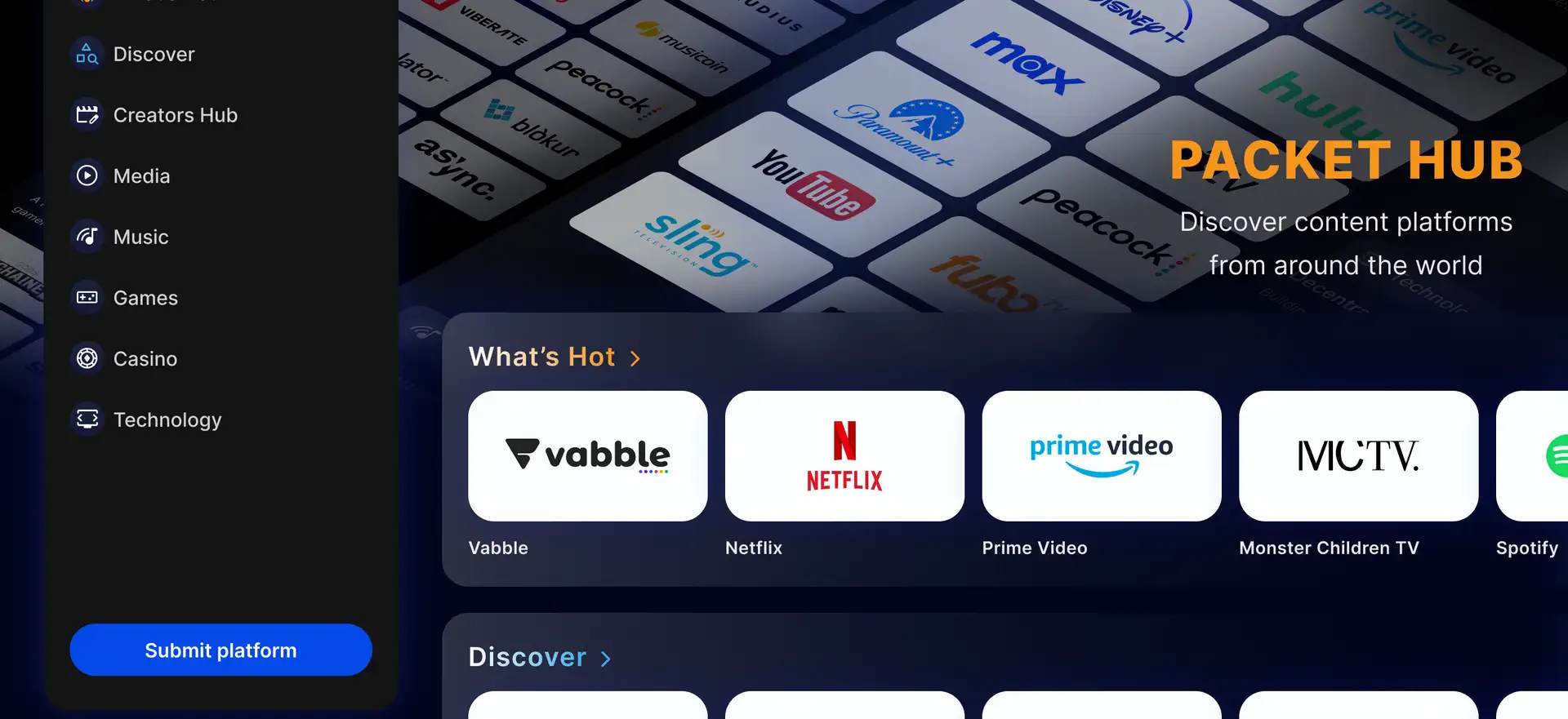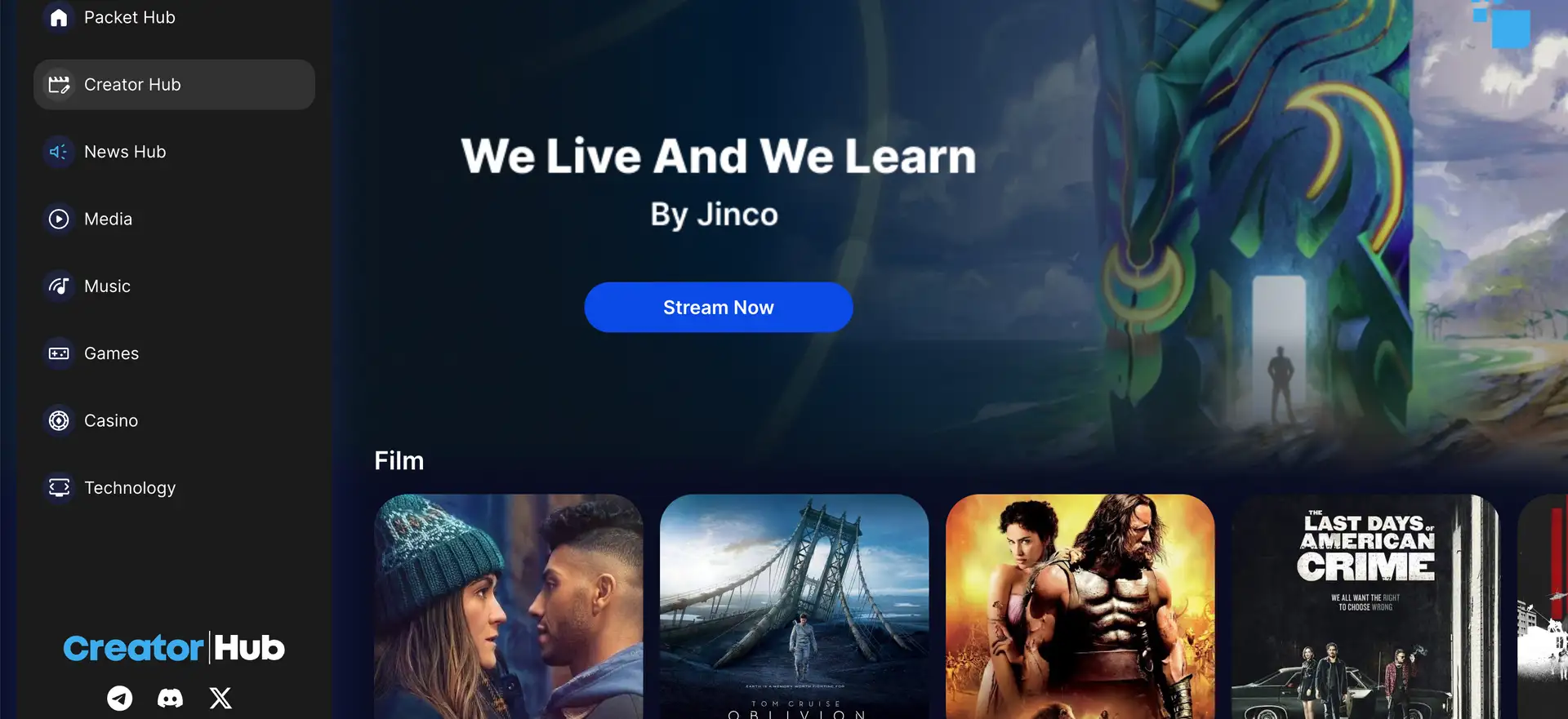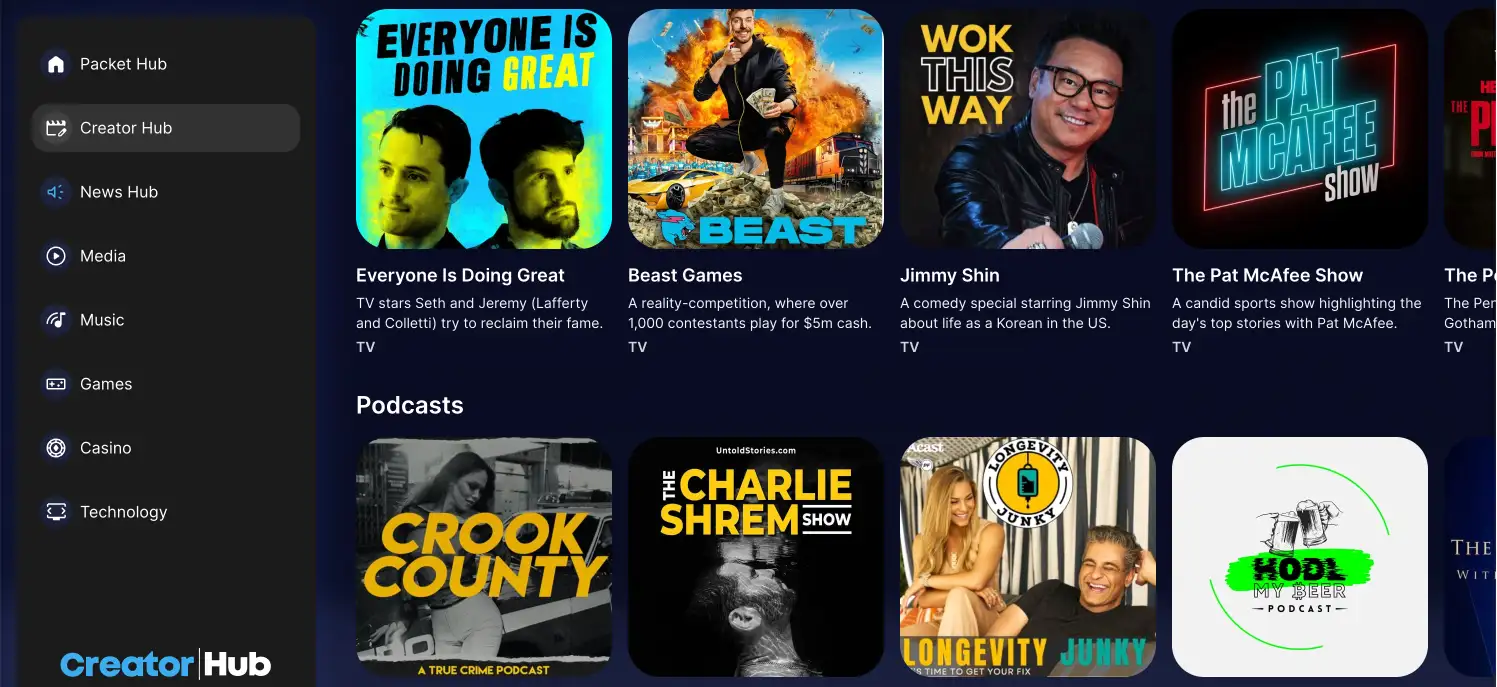About Packet
Packet is a decentralized media infrastructure protocol reshaping how content is distributed, monetized, and discovered online. Built on Base Network, Packet empowers users to host, stream, and engage with multimedia content free from the gatekeeping and restrictions of centralized platforms. The protocol’s native PKT token underpins a unique Stake-to-Earn model and supports a thriving open media hub known as Packet Hub.
With a focus on decentralization, resilience, and fair economics, Packet rethinks traditional media ecosystems by enabling peer-to-peer distribution, creator monetization without middlemen, and a censorship-resistant networking stack. Packet allows any platform to be discovered globally and monetized transparently—revolutionizing streaming, gaming, podcasting, and more.
Packet is not just a protocol — it’s an infrastructure layer for the next internet. Powered by cjdns and built on the Base L2 blockchain, it enables high-speed, censorship-resistant content delivery. Media creators can claim Packet domains and launch apps within the Packet Network or link existing Web2 destinations. The Packet Hub is the entry point, offering global visibility and discovery across categories like film, gaming, TV, podcasts, music, and Web3 content.
Unlike platforms like Netflix, YouTube, or Apple TV+ which charge heavy distribution and marketing fees, Packet operates without middlemen. Its blockchain-based framework allows creators to transact directly with users, earning revenue transparently via PKT. Additionally, users can stake PKT to power the network and use those rewards to subsidize content costs or pay creators directly.
The ecosystem supports three staking types: standard token staking, liquidity pool staking (with yield multipliers), and affiliate staking that promotes viral user growth. Content platforms and token ecosystems can gain visibility on the Packet Hub simply by claiming a free domain and submitting their project — a major contrast to closed ecosystems like Roku or Apple TV.
Packet fosters a governance system where the community votes using the Electorium algorithm. This system ensures transparency, balances influence based on stake, and removes centralized control. With its emphasis on open access, equitable monetization, and privacy-preserving infrastructure, Packet is poised to become a backbone for decentralized media in the Web3 era.
Packet offers a range of powerful features that position it as a game-changing platform for decentralized content delivery, monetization, and governance. These benefits support creators, platforms, and users alike in building an open and equitable media ecosystem.
- Stake-to-Earn Model: Users earn daily rewards by locking PKT and pairing with infrastructure nodes.
- Packet Hub Discovery: A decentralized platform showcasing content across media verticals with no geo-restrictions.
- Free-for-Life Domains: Claim unique domains for platform deployment or redirection to Web2 apps.
- Direct Monetization: Eliminate intermediaries and transact transparently with audiences using PKT.
- Proof-of-Stake Voting: Elect a Network Steward weekly and propose protocol changes using PKT weight.
- Multi-Phase Airdrops: Migration and adoption incentives via structured airdrop phases totaling 76.67% of supply.
- Token Utility & Interoperability: From content payments to domain registration and governance—all within the Base and broader Ethereum ecosystem.
To begin using Packet and the PKT Network:
- Explore the ecosystem: Visit hub.pkt.tv to discover platforms or claim your free Packet domain.
- Start staking: Go to app.pkt.cash and connect your MetaMask or Coinbase Wallet to begin earning PKT rewards.
- Buy PKT: Swap ETH on Base for PKT using Uniswap or directly through your Web3 wallet.
- Claim your airdrop: If you hold legacy PoW PKT tokens, access your migration airdrop via the Migration Portal.
- Participate in governance: Use the Electorium voting system by staking PKT and selecting a candidate wallet address.
- Read the documentation: Learn more via the official whitepaper at docs.pkt.cash.
Packet Token
Packet Reviews by Real Users
Packet FAQ
Packet Hub operates as a decentralized content discovery ecosystem, unlike centralized platforms like Netflix or YouTube that control visibility through algorithms and paywalls. With Packet Hub, content creators and platforms gain direct access to global audiences without censorship, geo-blocking, or exorbitant distribution fees. It’s built on the PKT Network, which enables an open, permissionless media infrastructure powered by community-run nodes.
When you stake PKT tokens, you’re not just earning yield—you’re actively supporting the PKT Network infrastructure. Each staking position must be paired with an operational node that helps route traffic across the network. This ensures economic rewards go directly to participants who provide real infrastructure value. The more reliable your node, the more sustainable the ecosystem becomes. Learn more at app.pkt.cash.
Electorium is a delegated voting algorithm that elects the most-supported candidate based on weighted PKT stakes. Unlike traditional majority voting systems, Electorium emphasizes decentralized consensus and vote delegation. It ensures candidates can only win if no other candidate can beat them—even if some voters are indirectly connected. This system avoids polarization and encourages a meritocratic approach to leadership within the network. Full details are in the PKT documentation.
Yes. On Packet Hub, platforms and creators can use PKT tokens to receive direct payments from their audiences, bypassing traditional payment processors. This direct-to-consumer model eliminates costly third-party commissions and enables transparent, auditable, and low-fee monetization. Platforms can also opt to subsidize content or offer token incentives to build user engagement.
The Executor in the PKT ecosystem is responsible for applying protocol rules that are not easily programmable into smart contracts—such as verifying node activity or validating DNS behavior. It is not a decision-maker but rather a rule enforcer. Over time, this role will be governed using the Electorium voting system, enabling a transition to a fully decentralized oversight model. Until then, the initial Executor is hardcoded into the protocol at launch.
You Might Also Like












